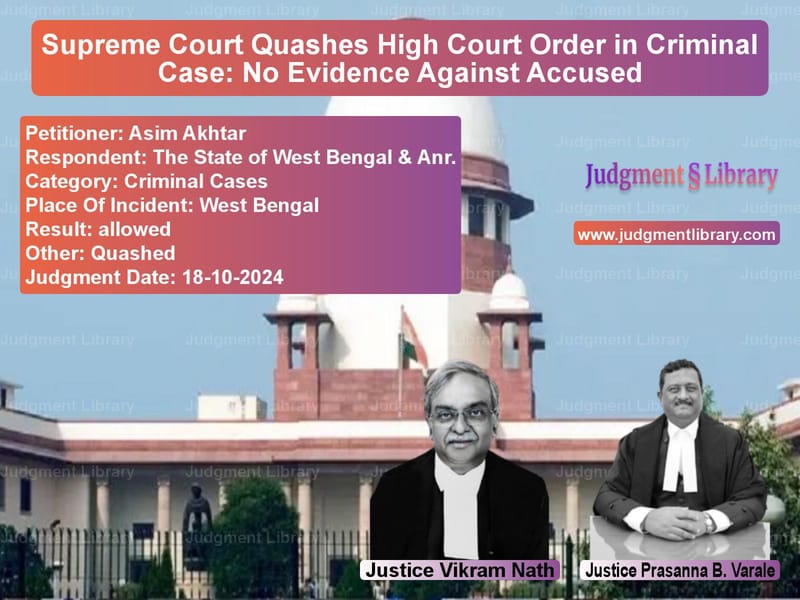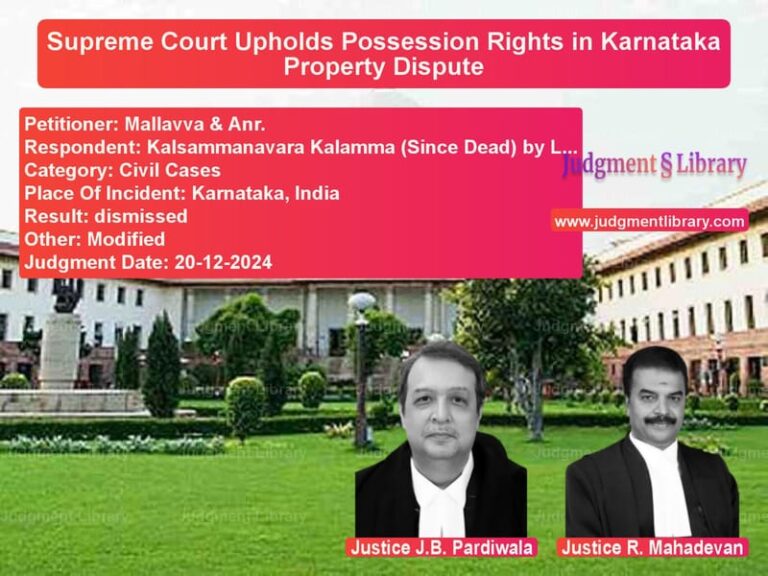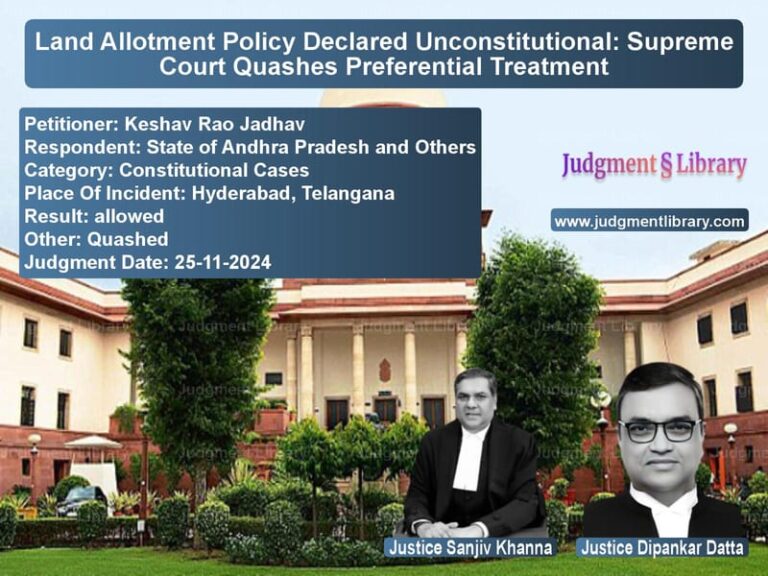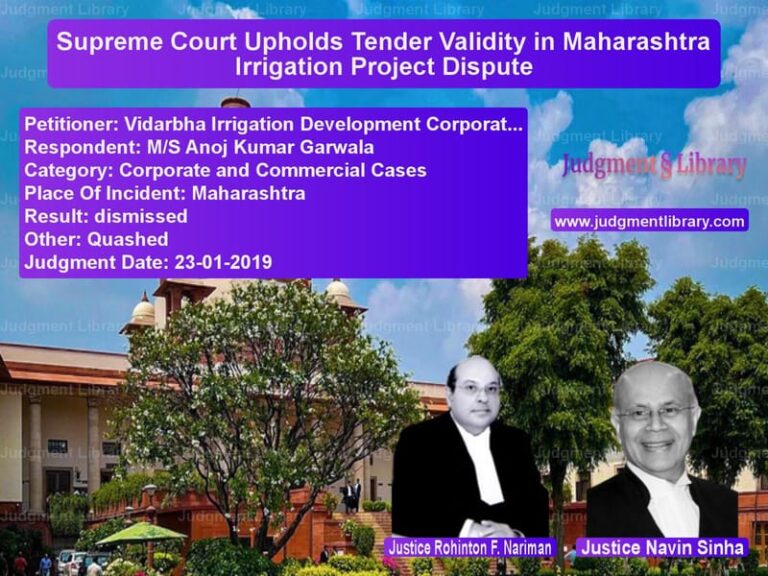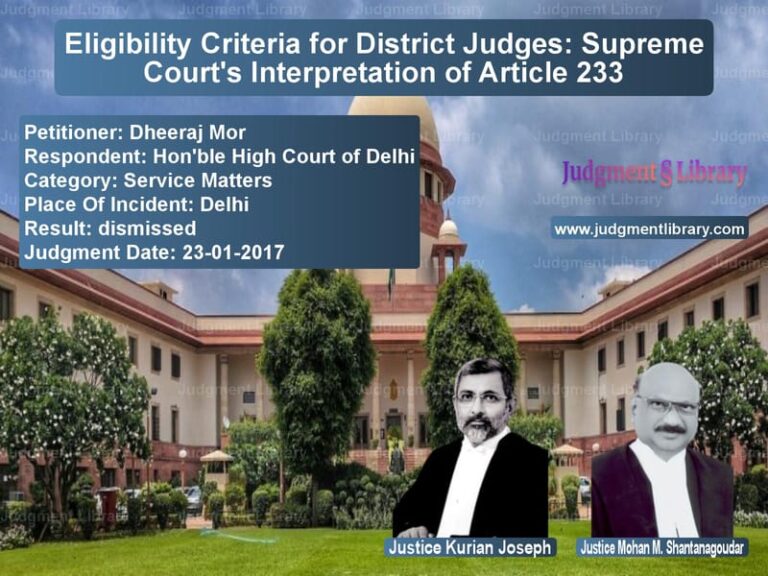Supreme Court Quashes High Court Order in Criminal Case: No Evidence Against Accused
The Supreme Court of India, in Asim Akhtar v. The State of West Bengal & Anr., delivered a significant judgment on October 18, 2024, quashing the High Court’s order that had remanded the case for further proceedings despite a clear absence of evidence. The Supreme Court ruled that the Trial Court was correct in treating the case as one of no evidence under Section 232 of the Code of Criminal Procedure (CrPC) and acquitting the accused.
Background of the Case
The case originated from an FIR (No. 125/2017) filed by the complainant on October 11, 2017, against the appellant, Asim Akhtar. The FIR alleged that the appellant attempted to kidnap the complainant and was charged under:
- Sections 366 (Kidnapping), 323 (Causing Hurt), 506(II) (Criminal Intimidation) of the Indian Penal Code (IPC)
- Section 25(1)(B)(a) of the Arms Act, 1950
After the investigation, the police filed a charge sheet on February 8, 2019. The trial commenced, and the prosecution produced three key witnesses:
- PW1: The complainant
- PW2: The complainant’s mother, Sabiya Rahaman
- PW3: The complainant’s father, Aslam Shaikh
The Examination-in-Chief of these witnesses was recorded on February 29, 2020, but their cross-examination was repeatedly deferred. The complainant and other prosecution witnesses failed to appear despite repeated summons.
Petitioner’s Arguments (Asim Akhtar)
The appellant, represented by legal counsel, argued:
- The prosecution witnesses willfully avoided cross-examination, leading to a situation where no evidence could be relied upon.
- The complainant moved an application under Section 319 CrPC to summon the appellant’s parents, but this was a deliberate attempt to delay the trial.
- The Trial Court rightfully recorded that the witnesses were not cooperating and had failed to appear despite multiple opportunities.
- The High Court erred in setting aside the Trial Court’s order, ignoring the fact that no legally admissible evidence was present.
Respondent’s Arguments (State of West Bengal & Complainant)
The respondents contended:
- The complainant was denied justice as the Trial Court should have first decided the Section 319 CrPC application before proceeding to acquittal.
- The complainant had faced threats, which led to her absence during cross-examination.
- The High Court correctly ordered a remand to ensure a fair trial.
Supreme Court’s Analysis and Judgment
Failure of Prosecution to Present Evidence
The Supreme Court held that the prosecution had failed to present legally admissible evidence:
“The Trial Court was correct in recording that, despite multiple opportunities, the prosecution witnesses failed to present themselves for cross-examination. In such a case, no reliance can be placed on their statements.”
Read also: https://judgmentlibrary.com/supreme-court-quashes-conviction-in-fake-caste-certificate-case/
No Mandatory Requirement to Decide Section 319 CrPC First
The Supreme Court rejected the High Court’s view that the application under Section 319 CrPC must be decided before proceeding with the trial:
“There is no mandate in law requiring a Trial Court to decide a Section 319 CrPC application before allowing cross-examination or proceeding with final judgment.”
Judicial Precedent on Cross-Examination
The Court cited Hardeep Singh v. State of Punjab (2014), stating:
“While an examination-in-chief is part of the record, the absence of cross-examination limits its evidentiary value. The Trial Court was right in dismissing the prosecution’s case due to the lack of witness testimony under cross-examination.”
Acquittal Based on No Evidence
The Court ruled that the Trial Court correctly acquitted the accused under Section 232 CrPC:
“A case of ‘no evidence’ arises when the prosecution fails to present any legally admissible material that can be tested in cross-examination. The Trial Court was justified in acquitting the accused in such circumstances.”
Key Takeaways from the Judgment
- Cross-Examination is Crucial: Evidence without cross-examination has limited legal value.
- No Automatic Priority to Section 319 Applications: Trial Courts have the discretion to decide when to address Section 319 applications.
- Ensuring Fair Trials: The judgment reinforces the need for witness cooperation in criminal trials.
Impact of the Judgment
- Protects Accused from Malicious Prosecution: The ruling prevents cases from dragging on due to deliberate non-appearance of witnesses.
- Clarifies the Role of Section 319 CrPC: Ensures that applications to summon additional accused do not automatically delay trials.
- Strengthens Trial Court Authority: Empowers lower courts to ensure fair and speedy trials.
Conclusion
The Supreme Court’s ruling in Asim Akhtar v. State of West Bengal sets a crucial precedent in criminal law by affirming that witnesses must be cross-examined for their testimony to be valid. It protects accused persons from being held in prolonged trials without evidence and ensures that procedural delays cannot be used as a tool to deny justice. This judgment reinforces the fundamental principles of criminal trials and the importance of fair procedures in the judicial system.
Petitioner Name: Asim Akhtar.Respondent Name: The State of West Bengal & Anr..Judgment By: Justice Vikram Nath, Justice Prasanna B. Varale.Place Of Incident: West Bengal.Judgment Date: 18-10-2024.
Don’t miss out on the full details! Download the complete judgment in PDF format below and gain valuable insights instantly!
Download Judgment: asim-akhtar-vs-the-state-of-west-be-supreme-court-of-india-judgment-dated-18-10-2024.pdf
Directly Download Judgment: Directly download this Judgment
See all petitions in Bail and Anticipatory Bail
See all petitions in Fraud and Forgery
See all petitions in Criminal Conspiracy
See all petitions in Attempt to Murder Cases
See all petitions in Custodial Deaths and Police Misconduct
See all petitions in Judgment by Vikram Nath
See all petitions in Judgment by Prasanna Bhalachandra Varale
See all petitions in allowed
See all petitions in Quashed
See all petitions in supreme court of India judgments October 2024
See all petitions in 2024 judgments
See all posts in Criminal Cases Category
See all allowed petitions in Criminal Cases Category
See all Dismissed petitions in Criminal Cases Category
See all partially allowed petitions in Criminal Cases Category

